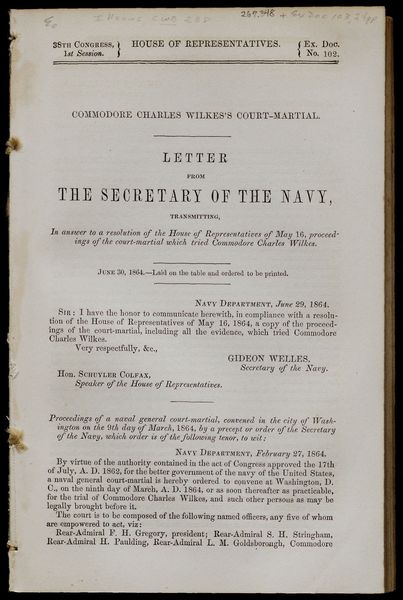Welles, Gideon (1802-1878) Commodore Charles Wilkes's court martial
High-resolution images are available to schools and libraries via subscription to American History, 1493-1943. Check to see if your school or library already has a subscription. Or click here for more information. You may also order a pdf of the image from us here.
A high-resolution version of this object is available for registered users. LOG IN
Gilder Lehrman Collection #: GLC00267.348 Author/Creator: Welles, Gideon (1802-1878) Place Written: Washington, D.C. Type: Book Date: 1864 Pagination: 1 v. : 325 p. ; 22.4 x 14.5 cm. Order a Copy
First 301 pages is the document titled "Commodore Charles Wilkes's Court-Martial," while the last 24 pages is a separate document titled "Commodore Charles Wilkes's Court of Inquiry." A report submitted by Secretary of the Navy Welles to the House of Representatives consisting of correspondence and documents pertaining to the court martial and court of inquiry of Charles Wilkes in 1864. Wilkes's court martial stemmed from a scathing letter he wrote expressing his anger about Welles's report on Wilkes's behavior after the Trent affair. Wilkes was the commander of the vessel that captured two Confederate diplomats on a neutral vessel, an event which almost led to war between the United States and Britain and France. This is a bound document, which appears to have been pulled from a larger bound book -- otherwise the book simply does not have a cover.
Wilkes, who was well known for his scientific voyages before the Civil War, was the commander of the "San Jacinto," which stopped the neutral ship "Trent" and captured the Confederate diplomats Mason and Slidell in 1861. Conflicts with the Navy Department, probably stemming from his treatment during the Trent affair negotiations as well as his anger over his disrated rank, culminated in Wilkes' court-martial early in 1864 over the publication of a letter he wrote to Gideon Welles castigating the Secretary for statements made against Wilkes in his annual report. On 26 April 1864, Acting Rear Admiral Wilkes was found guilty by court-martial of disobedience of orders, insubordination, and other specifications and was sentenced to receive a public reprimand and suspension from the service for three years. President Lincoln reduced the term of suspension to one year, at the conclusion of which Wilkes retired from the Navy. On 6 August 1866, he was promoted to rear admiral on the retired list and, for the remainder of his life, worked for the completion of publication of the results of the Wilkes Exploring Expedition. I Nevins 238.
Citation Guidelines for Online Resources
The copyright law of the United States (title 17, United States Code) governs the making of photocopies or other reproductions of copyrighted material. Under certain conditions specified in the law, libraries and archives are authorized to furnish a photocopy or other reproduction. One of these specific conditions is that the photocopy or reproduction is not to be “used for any purpose other than private study, scholarship, or research.” If a user makes a request for, or later uses, a photocopy or reproduction for purposes in excess of “fair use,” that user may be liable for copyright infringement. This institution reserves the right to refuse to accept a copying order if, in its judgment, fulfillment of the order would involve violation of copyright law.
